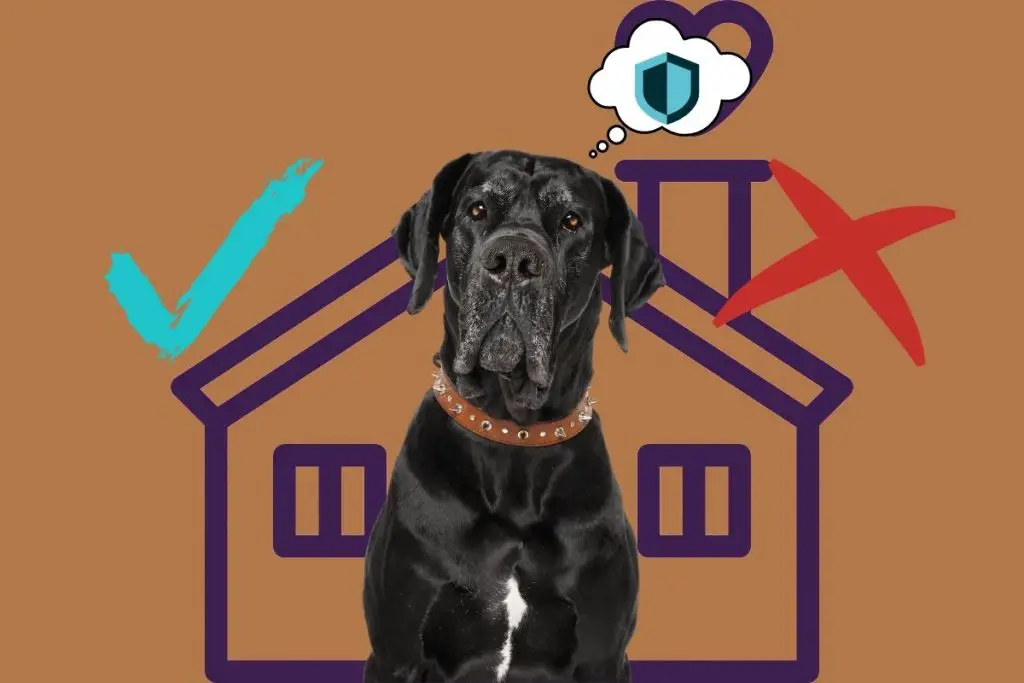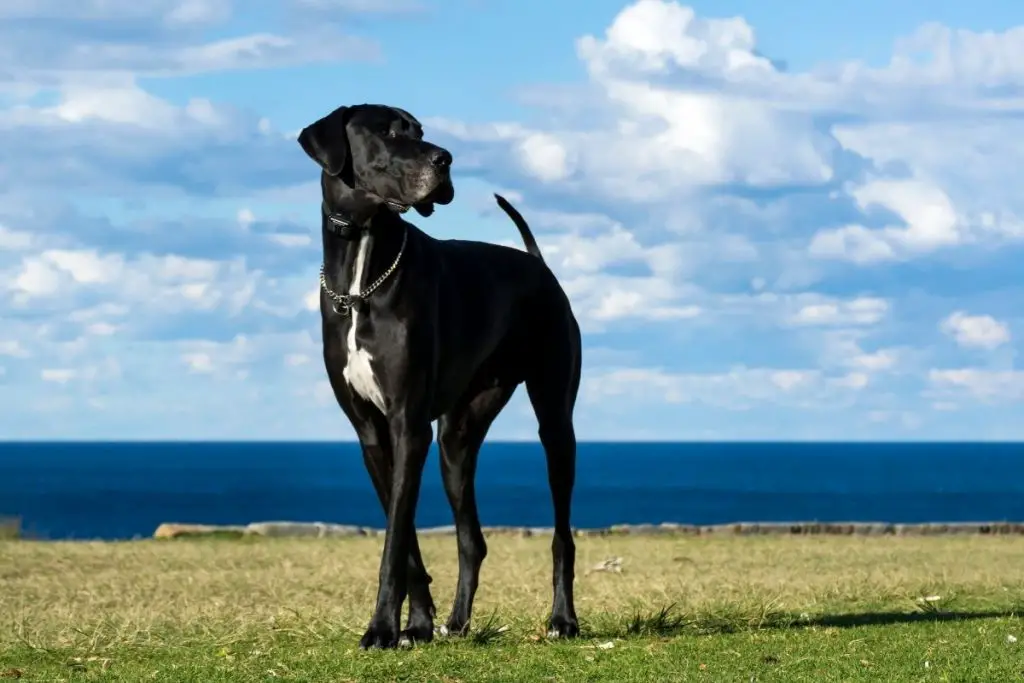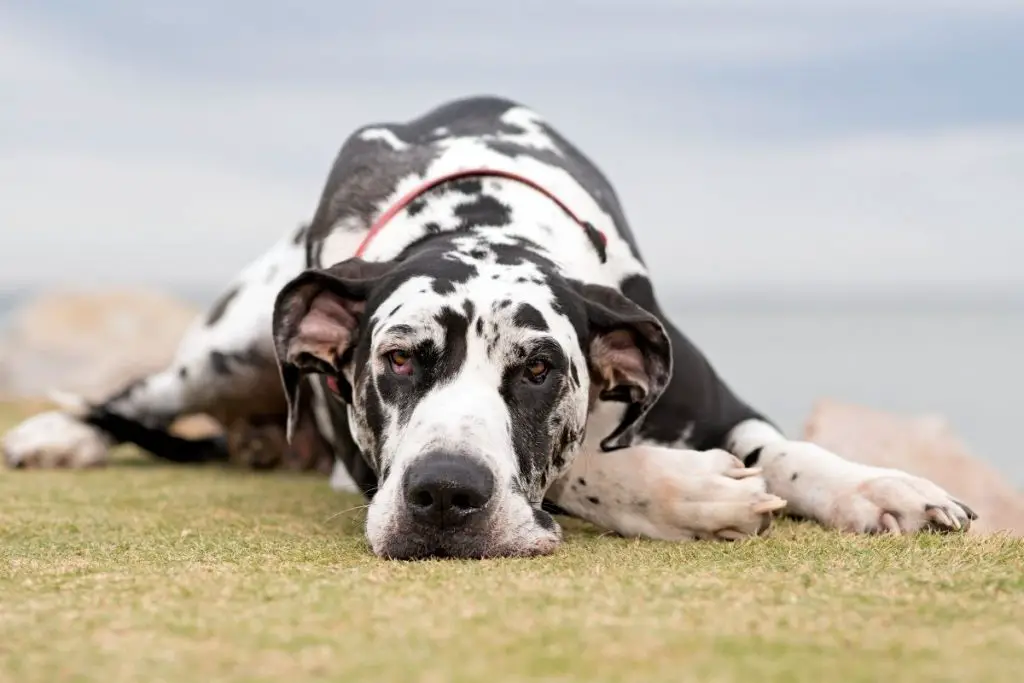Table of Contents

We have many reasons to call dogs ‘man’s best friend’. They are lovable, cuddly creatures that can serve as companions, friends, workers, and protectors in our lives and homes. A dog’s ability to instantly make us feel comforted and safe because of their presence is something that is hard to replicate in other animals.
Dogs also have a great love for us, from what we can tell, which makes it feel all the more special when they keep us safe. Nonetheless, despite all these wonderful universal traits dogs have, not all dogs are necessarily good guard dogs.
A chihuahua, for example, makes a fantastic watchdog, but its size leaves it at a disadvantage as a guard dog, don’t get me wrong they are still good guard dogs just not the best.
What about in the other size direction? How do Great Danes fare as guard dogs? They are big, muscular dogs, but their temperament is different from what you’d expect of a guard dog, will that be a problem? In this article, we will take a closer look at Great Danes and see whether they can cut it as a guardian of the family.
Difference Between Guard And Watch Dogs
Before we begin the article, we will have a look at the difference between a guard dog and a watch dog, as they are distinctly different roles that a dog can serve.
A watch dog’s only role is to sound the alarm and warn their owner of something not being quite right through barking. That should be their only role, they are not expected to engage the threat or intruder, and they should not be expected to hold their ground.
They are simply there to identify the threat, sound the alarm and keep sounding it, while staying safe themselves, until backup arrives. Watch dogs are regularly mistaken for guard dogs because they bark a lot and, due to a dog’s bark being loud and sometimes misunderstood, it can appear like the dog is being very aggressive.
However, this is not the case, if it is a watchdog. For this role as well, you only need a couple of traits, which most dogs have. Watch dogs need to be loud, they need to be aware of the territory of the place they are watching, and they need to be loyal.
On the other hand, guard dogs need to be a bit more proactive in their role. They are expected to guard the territory or property they are in and to protect the family or the livestock that exist in that territory.
They can alert their owners and other dogs to the presence of a threat like a watchdog, but that is not their primary function. Their primary function is to engage the potential threat, first through a forceful display that is normally a mock charge followed by barking, which is intended to scare the threat away while the dog holds its ground.
If that doesn’t work, then the dog will engage the threat, potentially with a bite. Any good guard dog will warn the intruder or threat before biting, this can be through a display or an action, but there should always be a clear and present warning to the intruder.
For a guard dog role, there are a few traits that are necessary in order to fulfill it successfully. These are a good size, determination, good strength, bravery, and a level head in tense circumstances.
Great Danes As Guard Dogs
The first dogs you think of when you think ‘guard dogs’ are probably Rottweilers or Dobermans, but how do Great Danes stack up? Well, they have good and bad points.
What Makes A Great Dane A Good Guard Dog?

There are a couple of traits that Great Danes possess that have the potential to make them excellent guard dogs. The first is their size. Great Danes were originally bred for hunting big game, like boars or even bears.
They would hold these animals in place while the hunters would finish them. For that, they required big bodies and are among the biggest dogs that exist, with the Guinness world record for largest dog going to a Great Dane called Zeus. Intruders who would see this large dog approaching would be far more likely to flee than try to take it on and, honestly, I would do the same.
Great Danes are some of the most alert dogs you will encounter. They react incredibly quickly to noises, smells, and moving objects faster than most other dogs. In fact, Great Danes scored a 5 out of 5 for vigilance when examined by the American Kennel Club and actively alerted family members to perceived threats.
This works greatly with their calm temperament. Great Danes will not fly off the handle at any given situation. They are not going to aggressively go after every sound they hear or anything out of the ordinary, instead they will assess the situation before making a move.
Being calm also means they are less likely to bite, unless it is necessary, choosing instead to bark very loudly or investigate themselves. This may seem like something you want from a guard dog, but realistically you only want it in actual threatening situations, rather than your dog biting the postman.
Work and activity are something important to Great Danes, and giving them a guard job will help them to feel stimulated. They will adhere to the task you give them with strict focus and will generally behave better if they have a job to do.
This also works well with their loyalty, as Great Danes love their families and are incredibly devoted to them. This loyalty doesn’t extend to strangers, and they tend to view people they don’t know warily. The skepticism held by Great Danes to strangers is perfect for a guard dog, as they will maintain that skepticism for intruders.
What Makes A Great Dane A Bad Guard Dog?

Unfortunately, while they are incredibly loving creatures, Great Danes are not really that smart. The main breeds of dog used for guard work are considered some of the brightest dogs, due to them learning commands after only 5 repetitions and will obey commands on the first command 95% of the time.
Great Danes, on the other hand, are outranked by 87 other dog breeds in terms of working or obedience intelligence.
It normally takes between 25 and 40 repetitions of a command to learn it, and they obey these commands only about half of the time, which is much lower than the brightest. While this may not seem like the worst thing for a guard dog, it is probably the role that needs the most training.
You require them to stop on command, so as to avoid unfortunate encounters like a dog continuing to bite someone beyond what you have told it.
Another problem with Great Danes is that they are loyal to their family, not necessarily the property or territory of the house. If an intruder breaks into your home while you are there, a Great Dane will leap into action to defend you.
However, if you are not in the house and someone breaks in, they may be wary of the intruder, but may also leave them alone to steal your stuff, because you are not there to defend.
This doesn’t mean you shouldn’t consider a Great Dane for a guard dog. They are wonderful family dogs, their size alone should scare away intruders, and with the right training and dedication, they can also make great guard dogs, making them a nice package deal.
Final Thoughts
Great Danes are not traditional guard dogs, however that does not mean they should be overlooked for the role. They are calm in stressful situations and have the physique to defend the house should it be required.
Just remember that it takes a lot of training to help them fill the role, as it is not natural for their temperament and their great power needs to be kept in check.
If, however, they fail as guard dogs, or even fail as watch dogs, they will still make incredible pets that your family will love, thanks to their gentle nature and loyalty.
